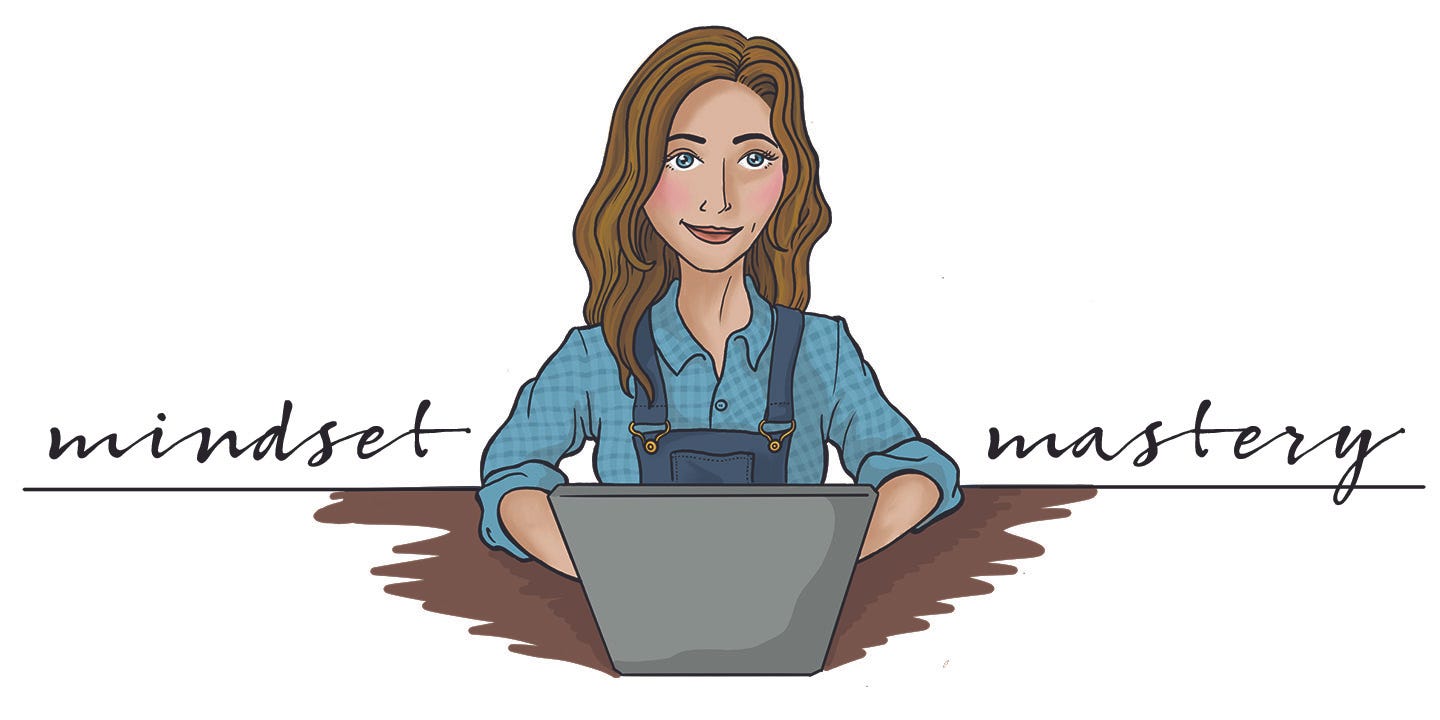Mindset Mastery is a weekly newsletter about the psychology of self-employment from Jenni Gritters. If you’d like to support my work, become a paid subscriber for $5/ month! Paid subscribers receive monthly business planning exercises, along with other perks like access to newsletters on sensitive topics.
If you’re tired of just surviving and want to move your business into a more intentional, less chaotic mode this fall, my new business coaching membership program is for you! It’s called SUSTAIN and this month, we’re focused on making more money. Register before the end of the day on October 2nd and get $50 off your first month’s membership with the code ALLIN.
In the past, I’ve talked a lot about choosing a third way: Opting out of the two standard, polarized options and instead finding something new in the grey area between here and there.
Recently, I’ve been applying this approach to how I think about money, too. In my world of mostly artists, creatives and writers, I tend to hear two very different approaches to money:
Control: You need to check your accounts every week. You need to invest aggressively. Your money is meant to be managed. Money is power. Create systems, balance your books every month, pay your taxes on time, create good financial habits, and you will feel more grounded.
On the other side, there’s the avoidant financial approach. This approach says that money is shameful. Money ruins art. Having more money causes more problems. If we want to avoid the possible ruin of money, we should just avoid money conversations entirely because talking about money is impolite. Do what you need to do to pay your bills, but that’s it. Don’t check your accounts; that causes stress. Pay off loans slowly, barely hacking away at your actual balance. Maintain your money but don’t let it overtake your psyche, lest it ruin your art and steal your joy.
As per usual, I find both of these options unappealing. One is about hustle, and strong-arming money into submission. The other is about completely looking away, going limp. I keep wondering: What would it look like to opt into a third way of thinking about money?
It’s worth noting that these typical reactions to money make sense! Money is so neutral that we often end up attaching emotion to it. By that I mean: Money represents a trade. I offer you something, then you offer me something. We’re moving value from my home to yours, and maybe back again later. But because money is tied to power in our society and because our caregivers (and their caregivers) may have had various good and bad experiences we money, we often end up with money fears, patterns and habits that we didn’t choose for ourselves.
The issues come when either of these polar options (hustle or ignore!) keeps us stuck, feeling anxious and trapped when we even start to think about our finances.
What could a third option look like, when it comes to working with money?
Perhaps a third way looks like fluidity, considering finances to be a gateway toward fun and play, like a river that rushes powerfully and playfully through the canyons.
Perhaps a third way looks like loosening the fist of control just slightly. Perhaps it means checking your books monthly but not feeling so rigid or perfectionistic about the natural ebb and flow of your balances.
Perhaps a third way is about hiring help and support around your finances so you can start to re-pattern the money habits you were likely gifted by your caregivers. (A bookkeeper! An accountant!)
Perhaps a third way is rethinking the strategy of how you price your art so you can experience some financial margin to save for the future.
Choosing the third way financially, to me, feels like re-mixing tight, grippy control with the fluidity of art. It feels like choosing structure and creative exploration. It’s having a system but holding it loosely, putting together two seemingly opposite approaches.
For me, a third way also involves trying to relax about making money, trying to untie suffering from financial abundance. (Isn’t it wild that the less I suffer, the more money I seem to make?)
What if money was a dance? What if money was a puzzle that could be put together differently every month, every season, to meet you in a values-aligned place?
What if money was like water, flowing into your life and then out again, in the direction of your choosing?
It sounds good, doesn’t it?
This third way is where we’re focusing our energy in SUSTAIN, my coaching membership program, in October. It’s money month, and we’re explicitly working toward making more money in each of our businesses. Yet, we’ll be talking about money by using words like stewardship, margin, relaxation, plenty, enough, courage and value.
We’ll be setting up a system for financial tracking, but we’ll also dig into the decades-long stories we’ve been telling ourselves about money.
We’ll talk to a financial planner, then we’ll meditate on what’s already abundant in our lives.
We’ll run numbers using my signature revenue calculator, then we’ll explore the concept of “enoughness” during this season, paired with nervous system management tools.
I could talk — and learn, and wonder — about money forever. This month, Mindset Mastery will be focused on financial exercises, concepts and stories, too.
I hope you’ll join me, wherever you are in your journey.
xo,
Jenni
Curious about my background? I’m a writer and business coach based in Central Oregon. I have two small children and I work part-time so I can spend a lot of time with them. Lately, I’ve been obsessed with non-linear business building and teaching people how to build successful businesses that support their human needs first. Check out my coaching offerings here, follow me on Twitter & Instagram, or download my free business plan for creatives!





